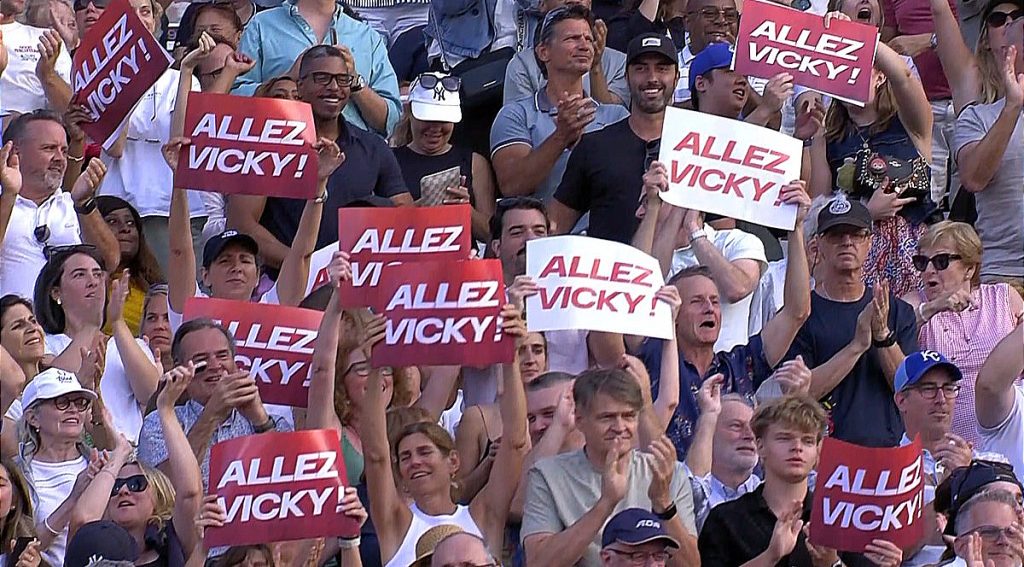
–
MONTREAL – First things first: you hope that the wrist injury Victoria Mboko suffered Wednesday night in her improbable win over Elena Rybakina doesn’t play a role in the outcome of the biggest match of her young career.
Because if the 18-year-old from Burlington, Ont. is on form, and can defeat her FOURTH former Grand Slam champion in this astonishing first extended edition of the Omnium Banque Nationale, it would be the story of the year in tennis.
And perhaps even in Canadian sport.

Rybakina served for the match, twice. And Mboko saved a match point as the 2022 Wimbledon champion’s forehand crumbled in the closing stages of an electric encounter before a sold-out Stade IGA crowd. A 1-6, 7-5, 7-6 (4) win that took two hours and 46 minutes to complete.
There are always two sides to the storyline of any tennis match. And Rybakina’s collapse will fade to black in the euphoria surrounding what Mboko has accomplished this week. But it’s not a knock on Mboko to also acknowledge what was happening on the other side of the net.
If anything, it’s a tribute to her own grit and competitiveness. Not only did she shake off the wrist injury, which occurred when she tried to break her fall after going over on her right ankle, she also shook off a nervy first set that ended in 31 minutes.

Mboko did what champions do: she hung in there, kept battling. And when the openings came, she plowed right through them.
“After the first set, of course, Elena was playing really great tennis. I didn’t have really much time to reflect on how I can improve and how I can do better. But you know, I kind of put in my head that I want to stay in there with her, and I want to bring as many balls back in the court as I possibly could, despite she was hitting a really clean and hard ball,” Mboko said last night. “So I think I just had that kind of mentality in the second set, and it really helped me get through a lot of difficult points as well.”
Rybakina’s forehand averaged 20 km/h more than Mboko’s; her backhand, 10 km/h more. So on paper, Rybakina is better than Mboko at what the Canadian does best at this stage. Still, she just fought.
And while Rybakina is having a much better season in 2025 than in 2024, when she withdrew from a number of tournaments with various illnesses, her inability to close out matches in a number of big moments (vs. Swiatek, and Sabalenka, to name two) has been a recurring theme.

The forehand began to fly long and wide. And in most cases, they appeared to be routine forehands that didn’t have her on the run. At the start of the match, the Kazakh was winning the longer rallies. By the end, she was the one ending them – and not on the winning side.

Waking up to a new reality

Mboko probably still couldn’t even believe it when she woke up this morning. No doubt the wrist was stiff and sore, too, after all the adrenaline wore off.
But being 18, things don’t hurt as much, for as long. And being used to playing with the pain of knees that barked at her for most of her junior career, Mboko has shown her pain tolerance to be pretty high. You have to hope she’ll just get on with it, and find a way.
Her appetite for winning is a big part of what got her to this stage. And there’s one more to go.
For Osaka, all gravy
Maybe it got lost in defeat, but as much as the 27-year-old has struggled to find her form of old since her return from maternity leave, there was a subtle shift at Wimbledon.
It was the match against Anastasia Pavlyuchenkova, which she lost in three sets but in which she displayed a determination to run for every ball and fight like hell, a fight that had been there one minute and gone the next in the 10 months since her return.
It didn’t pay off there. It didn’t pay off in Washington, where she lost to Emma Raducanu.
But it’s showing now. It appears she has finally turned the corner.

Another new beginning for Osaka
The noted introvert has shown off a giddy, sassy side in her on-court interviews that we’ve rarely seen. It’s almost as though she’s free again – free of the expectations that came from the younger version of herself, and fit once more with a renewed joy for the game.
None of that, it should be stressed, has anything to do with the arrival of prospective new coach Tomasz Witkorowski in Montreal last week. He brought no magic formula with him.
Except for this: in her down moments over the last year, Osaka would say that she felt the shadow of Serena Williams looming over her association with now-former coach Patrick Mouratoglou. Especially when she wasn’t winning.
And now, that’s gone.
Not that Mouratoglou would in any way compare her to the GOAT of women’s tennis; it was all in Osaka’s own mindset, her inherent sense of hating to disappoint anyone.
But now, it’s another fresh start. And Osaka has been playing as if it is.
Will the pressure come back?

And so, as Osaka plays her first WTA-level final since Miami in 2022 (she made the Auckland final to start the 2025 season, but withdrew because of injury), it will be fascinating to see if the pressure of expectation – her own, and others’ – kicks in.
She faces a player nine years younger who has cited her as a player she admired. It was a lifetime ago, when Mboko was a 14-year-old and Osaka had won four Grand Slam titles.
The one in blue. https://t.co/qBlyvnSREQ
— Stephanie Myles (@OpenCourt) August 7, 2025
And she found that pretty amusing Wednesday night, after she defeated Clara Tauson 6-2, 7-6 (7) in the second semifinal.
“I don’t think that’s ever happened. I’m shook,” Osaka said, laughing. “No, I mean, it’s really cute. I guess I have to have a really good attitude tomorrow. I can’t let her not like me anymore. It’s funny because I see her on the TV, and I was low-key, like, ‘That’s my little twin, because we both have our blue dresses and our buns and everything’.
“I mean, I’m really honored. I always said that I would love to play someone that looked up to me in a way, so it’s happening way sooner than I thought it would.”
More Stories
Canucks This Week – Week ending Oct. 17, 2025
WTA Rankings Report – As of Oct. 6, 2025
Canucks This Week – Week ending Oct. 12, 2025 (Friday results)